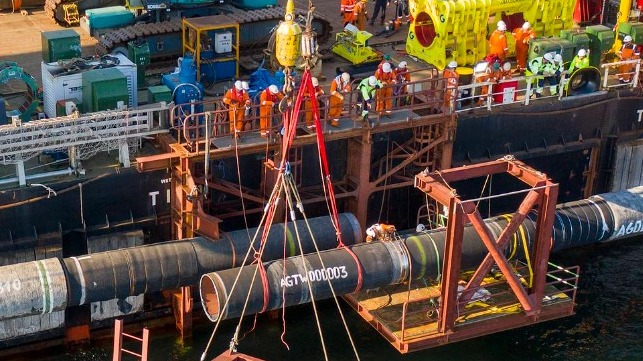In Strategic Win For Russia, Nord Stream 2 Pipeline is Fully Complete

Marking a major foreign policy success for the Russian government, state-owned gas producer Gazprom announced Friday that it has completed the Nord Stream 2 pipeline connecting St. Petersburg with Germany's Baltic coast. The line will double the amount of gas that Russia can deliver to European customers by the Baltic route, giving Moscow a new alternative to existing pipeline networks on shore.
"Today, the sections of the second Nord Stream 2 pipeline laid from the German shore and Danish waters have been connected in a so-called above water tie-in. The opposing pipe strings were lifted from the seabed by the lay barge Fortuna and the pipe ends were cut and fitted together," Gazprom said in a statement. "The welding to connect the two lines took place on a platform located above the water on the side of the vessel. Then the connected pipeline was lowered to the seabed as one continuous string. Afterwards, the required pre-commissioning activities will be carried out with the goal to put the pipeline into operation before the end of this year."
The completed pipeline raises the possibility that Russia will shift Europe-bound gas shipment volumes away from U.S.-allied Ukraine, which currently receives about $3 billion per year in revenue from Gazprom in exchange for the use of its pipelines. Ukraine's contract for gas transport will expire in 2024, and Russian President Vladimir Putin has previously said that Ukraine must show "good will" if it wishes to continue to carry Gazprom's product. Relationships between the neighboring countries are tense: Russia annexed Ukrainian Crimea by force in 2014, and it supports Russian-allied partisans in the ongoing fight for control of the eastern Ukrainian region of Donbass.
In late 2019, recognizing that Nord Stream 2 would reduce the security of U.S.-allied countries in Eastern Europe, the United States Congress enacted legislation requiring sanctions on certain vessels and businesses engaged in the pipeline project. These bipartisan sanctions measures forced the withdrawal of the project's original pipelay contractor, Allseas, and delayed work on the line by about one year.

that matters most
Get the latest maritime news delivered to your inbox daily.
In 2020, Gazprom chartered two Russian-flagged pipelay vessels to replace Allseas' assets, and it renewed its work in February 2021. It encountered little resistance from the Biden administration, which has declined to enforce sanctions on the project's biggest participants. In particular, the administration waived penalties on Nord Stream 2 AG, a Switzerland-based holding company co-owned by Gazprom, effectively paving the way for the project's completion.
"I have determined that it is in the national interest of the United States to waive the application of sanctions on Nord Stream 2 AG, its CEO Matthias Warnig, and Nord Stream 2 AG’s corporate officers," said U.S. Secretary of State Anthony Blinken on May 19. "We will continue to oppose the completion of this project, which would weaken European energy security and that of Ukraine and Eastern flank NATO and EU countries."
